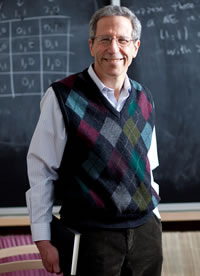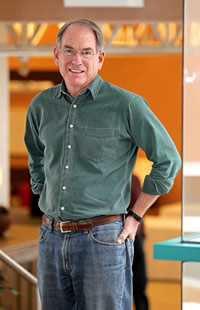Keynote speakers
Eric Maskin

Eric Maskin is Adams University Professor at Harvard. He received the 2007 Nobel Memorial Prize in Economics (with L. Hurwicz and R.Myerson) for laying the foundations of mechanism design theory. He also has made contributions to game theory, contract theory, social choice theory, political economy, and other areas of economics. He received his A.B. and Ph.D from Harvard and was a postdoctoral fellow at Jesus College, Cambridge University. He was a faculty member at MIT from 1977-1984, Harvard from 1985-2000, and the Institute for Advanced Study from 2000-2011. He rejoined the Harvard faculty in 2012. He is a member of the National Academy of Sciences and a fellow of the Econometric Society, the American Academy of Arts and Sciences, the British Academy, the European Economic Association, the Royal Spanish Academy of Economics and Finance, and the Society for the Advancement of Economic Theory. He is an honorary fellow of St John’s College, Cambridge and Jesus College, Cambridge. He is an honorary professor of six universities and the recipient of eight honorary doctorates. Among other prizes, he has received the Kempe Award in environmental economics, the EFR-Business Week Award, the Grande Médaille from both the cities of Marseille and Toulouse, the Harvard Centennial Medal, the Cristóbal Gabarrón Foundation International Award in Economics, and the Jean-Jacques Laffont Prize. He has served as editor of the Quarterly Journal of Economics, Economics Letters, and the Economic Theory Series (World Scientific Publishing) and as associate or advisory editor of several other journals. He is a past president of the Econometric Society and the Game Theory Society. He is the director of the Jerusalem School in Economic Theory.
“Mechanism Design:
Building Institutions to Achieve Social Goals”
Mechanism design is the "reverse engineering" part of economics: Given a social goal, we work backwards to try to build an institution or mechanism for achieving that goal. In this lecture, I provide an introduction to the subject by means of a few simple examples.
Samuel Bowles

Samuel Bowles, (PhD, Economics, Harvard University) is Research Professor at the Santa Fe Institute where he heads the Behavioral Sciences Program, and is the author of Microeconomics: Behavior, Institutions and Evolution and co-author (with Herbert Gintis) of A Cooperative Species: Reciprocity and Human Evolution. He taught economics at Harvard from 1965 to 1973 and since then at the University of Massachusetts, where he is now emeritus professor and at the University of Siena from 2002 to 2010. His recent studies on cultural and genetic evolution, published in Science, Nature, the Journal of Theoretical Biology and Theoretical Population Biology have challenged the conventional economic assumption that people are motivated entirely by self-interest. Recent papers have also explored how organizations, communities and nations could be better governed in light of the fact that altruistic and ethical motives are common in most populations. Bowles' current research also includes theoretical and empirical studies of political hierarchy, private property, and wealth inequality and their evolution over the very long run.
“The Origin of Private Property”
A standard explanation of the origin of individual property rights is that with the amelioration of climate variability around 12 thousand years ago, the productivity of farming exceeded that of foraging, resulting in the rapid spread of farming, and with it the private property rights that farming required. But this account is mistaken: the first farmers were almost certainly no more productive than the foragers they replaced, and in some areas the emergence of private property predates the advent of farming. An evolutionary game theoretic model of the coevolution of institutions and technology, along with agent based simulations to match late Pleistocene and early Holocene conditions replicates the known prehistoric record. Together with archaeological evidence, our results suggest that institutional innovation, not technological progress, may have played the leading role in many instances of the early Holocene agricultural revolution.






